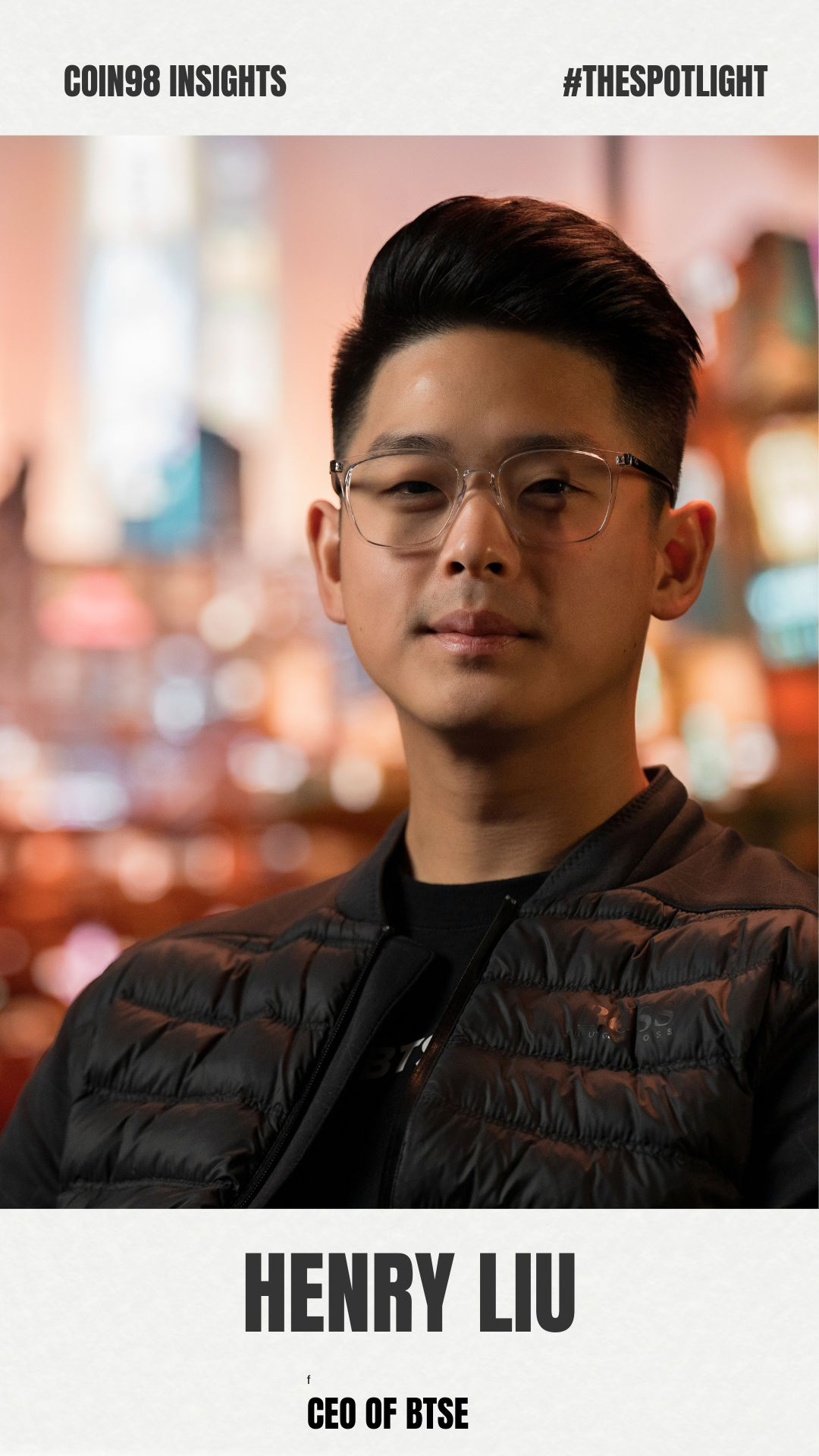From a Young Pilot to the CEO of Crypto Exchange BTSE

Henry Liu earned a pilot's license at the age of 16, but later shifted his focus to the financial sector, gaining experience in various businesses around the world. Eventually, the young Canadian found his place in the crypto market, ascending to the position of CEO at the BTSE exchange.
The Spotlight is a series of conversations between Coin98 and industry builders about hot topics in the market.

- What prompted your transition from traditional finance to crypto?
Henry Liu: I consider the shift from traditional finance to crypto as a natural progression. Prior to this, I worked with companies heavily invested in technology and finance, engaging in capital raising activities and facilitating companies' listings on stock exchanges. I also explored the telecommunications industry, which, like crypto, exhibits innovation, though at a slower pace.
In the years 2016-2017, during the inception of BTSE, crypto regulations were limited. We initially structured the company with a traditional finance focus and gradually transitioned it towards crypto, aiming for increased professionalism.
I'm drawn to the crypto industry because of its innovation and rapid pace. It's noteworthy that a week in crypto is undeniably longer than a year in traditional finance.

I'm drawn to the crypto industry because of its innovation and rapid pace. It's noteworthy that a week in crypto is undeniably longer than a year in traditional finance.
- Could you share the genesis and development journey of BTSE, which was established five years ago?
Henry Liu: We commenced operations in 2018 as an engineering company, subsequently evolving into a leading crypto business infrastructure. Our team comprises experienced professionals skilled in constructing high-frequency trading systems and low-latency infrastructure.
Currently, BTSE is actively seeking opportunities to expand its business and cater to a wider user base. The success of BTSE is not solely attributable to me and the founding members but is a collective effort of our entire staff and community.
- In comparison to other exchanges like Binance or OKX, what sets BTSE apart?
Henry Liu: BTSE stands for Buy, Trade, Sell, and Earn. We concentrate on these four aspects, aiming to maintain a user-friendly platform. Our focus lies in infrastructure development, ensuring a seamless trading experience with high liquidity.
This includes features such as multi-asset guarantees and perpetual futures contracts. Additionally, BTSE prioritizes providing secure fiat currency conversion options at favorable rates, along with compliance with laws in different global regions.
These strengths, I believe, distinguish BTSE from other exchanges.
- Addressing liquidity and user trust is a challenge for new exchanges. How is BTSE tackling these issues?
Henry Liu: At BTSE, we've consistently prioritized enhancing liquidity since our establishment. Presently, our liquidity remains stable, mitigating price slippage risks for users and enhancing their overall trading experience. Regarding user trust, we are committed to regulatory compliance and maintaining transparency.

- Major centralized exchanges like Binance and Coinbase are currently facing legal issues, leading to user departures. What is your perspective on this?
Henry Liu: The recent regulatory developments by the SEC and CFTC, coupled with the unpredictable market, have created challenges for major exchanges, including Binance. However, I believe this doesn't weaken the industry; rather, it signifies a shift toward increased transparency, benefiting everyone.
This trend, I believe, contributes to the industry's growth, irrespective of the developments in the U.S.
The tightening regulatory grip on crypto in the U.S. is redirecting attention to Asia, evident in regulatory activities in Hong Kong, Singapore, and throughout Southeast Asia. This trend, I believe, contributes to the industry's growth, irrespective of the developments in the U.S.
Read more: Director of Klaytn: Terra's collapse spurred cautious investment among Korean youth.
- Do you see the legal troubles faced by large centralized exchanges as an opportunity for smaller ones with less regulatory attention?
Henry Liu: Smaller centralized exchanges can leverage the valuable lessons learned from their predecessors. Despite their size, compliance with the law, especially concerning handling others' funds, remains paramount. Thus, small exchanges should approach issues diligently, staying abreast of developments and preparing for legal requirements during their growth.
- Major centralized exchanges are constructing decentralized wallets and investing in other DeFi products. Do you believe this indicates preparation for the eventual decline of centralized exchanges?
Henry Liu: I believe centralized exchanges (CEXs) and decentralized finance (DeFi) will coexist. CEXs often serve as the initial gateway for newcomers entering the crypto and Web3 space, akin to a digital bank. Utilizing DeFi tools and integrating decentralized products is crucial for CEXs to enhance user value, offering transparency and user control.
BTSE, like many others, is developing a decentralized exchange (DEX). While CEXs and DEXs are distinct, they are both vital for the industry and can grow in parallel. Users often maintain accounts on both types of exchanges.
The goal of a DEX, in my view, is to optimize its operations to approach the performance of a CEX. Although current technology has improved DEX speed, performance, and liquidity, they still lag behind CEXs. In the future, CEXs may focus on providing high liquidity and high-frequency trading, while DEXs offer flexibility for users to trade various assets freely.
In the future, CEXs may focus on providing high liquidity and high-frequency trading, while DEXs offer flexibility for users to trade various assets freely.
In summary, this isn't the end for CEXs; it's just the beginning.
- Asia has emerged as the center of crypto. Has BTSE encountered any challenges operating in Hong Kong, which is considered a leader in crypto regulations, or in the Chinese market, with its strict crypto bans?
Henry Liu: We have a significant presence in Hong Kong due to its rapid growth and innovation in the crypto industry. Although we don't directly engage with China via RMB, we support numerous projects and developers from the country. In Hong Kong, we are navigating new regulations by assisting companies with licensing applications.